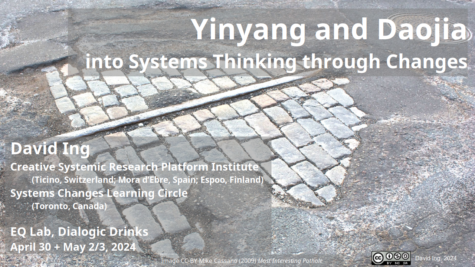Reading a theorist who espouses the dao (tao) in their systems work? Here’s a challenge: is the writer referring to daojia, or daojiao?
- Daojiao 道教 is religious daoism, gaining legitimacy only with the Tang dynasty (712-758 CE), after many centuries with the religion of Confucianism as dominant.
- Classical Chinese philosophy is hard to interpret even by Chinese literati, because standardized writing didn’t occur until the Qin dynasty, circa 221 BCE.
- Daojia 道家 is philosophical daoism, associated with the DaoDeJing (translated as the “Classic of the Way, and the Classical of Virtue”, also known as the Laozi, dating back to 300-400 BCE.
- During the Eastern Zhou dynasty (771-256 BCE), there were six philosophical lineages, including the Yinyang School.
- According to Sima Tan, the six philosophical lineages were (i) Yinyang; (ii) Confucian; (iii) Mohist; (iv) Legalist; (v) Schoolf of Names; and (vi) Daoist
Yinyang and daojia are considerably older than daojiao. The Systems Changes Learning Circle is most interested in philosophy of science, with a concrete application in Classical Chinese Medicine (CCM). Yinyang is foundational in CCM, and religion doesn’t enter into the science of medicine, unless the inquirer wants to delve into the question of “what is nature”?
After the EQ Lab session of Dialogic Drinks, in April on “From Unfreezing-Refreezing, to Systems Changes Learning“, I challenged myself to see if I could create an presentation on Chinese philosophy of science that might be understandable to those of us trained in the Western sciences. Much of the art of presenting was in selecting imagery, more than providing wordy definitions.
This recording of the presentation segments is available on Youtube , as well as on the Internet Archive .
| Video | H.264 MP4 |
| May 2-3 (30m52s) |
[20240430_EqLab_Ing YinyangDaojia_SystemsChanges_2191kbps.m4v] (HD 2191kbps 523MB) [on the Internet Archive] |
These Dialogic Drinks sessions are weighted less on presentation, and more on discussions and reflections.
| A. Welcome | Introduction | :05 |
| Ice-breaker | :05 | |
| B. ↓ Linear Movement (Monadic); ↑ Rhythmic Complements (Dyadic) | Presentation One | :07 |
| Dialogue One | :20 | |
| Reflection One | :10 | |
| C. ↓ Progressive Development; ↑ Contextural Threading | Presentation Two | :07 |
| Dialogue Two | :20 | |
| Reflection Two | :10 | |
| D.↓ Subjective Initiative; ↑ Situational Potential | Presentation Three | :07 |
| Dialogue Three | :20 | |
| Reflection Three | :10 | |
| E. After Hours | :30 |
The approach was to point out the conventional Western predisiposition that might be deprecated, alongside an alternative (Chinese philosophical) reorientation that might be elevated. The total presentation time in the recordings is 30 minutes total, in three sections.
Here is the original abstract sent in advance.
Science, in the West, is much based on the eternal (Parmenides), and forms with substance (Plato). Classical Chinese Medicine is based on a science of rhythmic processes. Correlations were made with the dusking-dawning of celestial bodies, ebbing-flowing of tides, and harvesting-sowing of crops.
Daojia is a philosophy based on yinyang. Daojiao is a religion based on yinyang. Yinyang is typically misunderstood by Westerners as alternations of state. Yin qi and yang qi are more clearly expressed as verbs in complements. e.g. dissipating alongside concentrating, waning alongside waxing.
Systems thinking in English-speaking countries has largely been dominated by theories (technically hypotheses) of a world as mechanicist (unfreeze-refreeze), or a world as organicist (progressive development). A shift towards Systems Changes reifies learning on a distinctly different world theory of dyadicism-contexturalism (yinyang dancing through seasons).
This Dialogic Drinks session will open with an ice breaker::.
- Which sciences have most shaped your experience? Maybe physics? chemistry? biology? ecology? anthropology? psychology? sociology? economics? et. al.?
Three short presentations will spark discussions on:
- What are the challenges to (i) deprecating straight lining (point-to-point) while (ii) elevating dyadic rhythming (waning-waxing, dissipating-concentrating?
- What are the challenges to (i) deprecating building up parts-with-parts into wholes, while (ii) elevating knitting threads-alongside-threads into textures?
- What are the challenges of (i) deprecating subjective initiative, while (ii) elevating situational potential?
This DD conversation is second in a series, following the March session on “From Unfreezing-Refreezing, to Systems Changes Learning”. Highlights from March 2024 are at https://coevolving.com/blogs/index.php/archive/from-unfreezing-refreezing-eq-lab/.
Slides are posted at https://coevolving.com/commons/2024-04-yinyang-daojia-systems-changes



